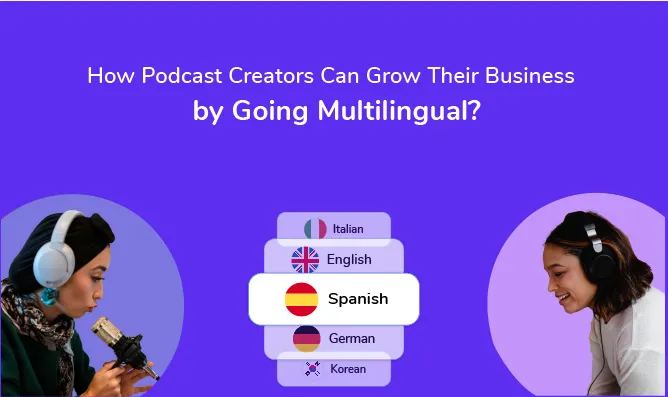How To Grow Your Podcast Business With Multiple Languages?
What music do you listen to every week when washing laundry? Or perhaps while doing the dishes? If your favorite podcast sprang to mind, you are one among the 383.7 million people who will be listening to podcasts as of November 2022. However, did you know that non-native English speakers make up the nations with the fastest-growing podcast audiences? These include, among others, China, Chile, Argentina, Peru, and Mexico. In fact, it is not surprising that the popularity of multilingual podcasts has increased over the past few years.
A blog entry in Harvard’s Nieman Lab in March 2021 noted how intriguing it was that an actual crime podcast called The Nobody Zone was available in five languages. And the year before that, when they announced that podcasts would be available in languages other than only English, two big U.S. podcast platforms, Wondery and iHeartMedia, were among the early adopters of multilingual podcasts. Multilingual podcasts are a fantastic method to tap into local audiences worldwide.

Benefits of Multilingual Podcasting
There are several benefits to creating and distributing multilingual podcasts:
- Reaching a wider audience: By creating podcasts in multiple languages, you can get people who speak those languages and may have yet to be able to access your content.
- Promoting language learning: Multilingual podcasts can be a valuable resource for people learning a new language, as they can provide authentic listening practice.
- Enhancing cultural understanding: You can promote cultural awareness and exchange between different language communities by producing podcasts in multiple languages.
- Expanding your market: Depending on your chosen languages, creating multilingual podcasts can allow you to reach new markets and a wider audience.
- Improving accessibility: Providing content in multiple languages can make your podcast more accessible to people who may not be fluent in the primary language of the podcast.
How are Multilingual Podcasters Growing Their Audience?
Here are some strategies that compelling multilingual podcasts use to reach regional listeners.
1. They Have Their Scripts Transcribed.
The multilingual version of a podcast episode is significantly easier to produce when there is a written script. The issue of being found in a sea of content is another. Search engines can comprehend the audio files you have when you provide a transcript and open up SEO options to take advantage of search engine results. Although you could pay native speakers to translate your script into several languages, this could be expensive and logistically difficult to execute for each episode.
AI transcription is an alternative that may be useful. AI-based multilingual script writing tools like those offered by various applications can be advantageous for various reasons, including the absence of additional costs for professional transcription services, the ability to edit what the AI generates using user-friendly software, and an instantly generated transcription in the target language.
2. They Are Doing Content Localization
The translation is only half the battle to properly communicate with listeners from other cultures. Investment in localization is a very profitable way to reach new markets. In addition to correct translation, localization also refers to the capacity to be culturally relevant. Consider its significance: If you only draw inspiration from English-speaking cultures, you won’t keep viewers who don’t speak English coming back for more episodes.
While not all content creators must localize their works, the majority would gain from doing so. Good podcasters ensure each episode resonates with a local audience to increase the stickiness of their series. They do this by including local humor, cultural allusions from music or TV, language-specific jokes, or regional dialects in the script. A thorough awareness of the cultures you want to reach with your content can help you embrace localization.
3. They Are Utilizing Expert Voice-over Services.
To engage with native audiences, a non-English podcast’s pronunciation accuracy is crucial. However, how could someone hire numerous voice actors for each language they wanted to translate their podcast into? Some people can afford this expense, but others can choose AI dubbing. It’s exactly what it sounds like: a human-sounding voice reading a screenplay in the selected language. AI dubbing can significantly speed up and improve the accuracy, cost, and flexibility of podcast creation for creators.

Understanding the Audience of Multilingual Podcasts
If you’re considering creating a multilingual podcast, it’s essential to understand the audience that you’re trying to reach. Some questions you might consider include the following:
- What languages do your potential listeners speak?
- What countries or regions do they live in?
- What are their interests and hobbies?
- What is their level of proficiency in the languages you plan to use in your podcast?
By understanding your audience, you can present your podcast to better meet their needs and interests. Consider partnering with other organizations or individuals with a shared interest in reaching a similar audience. This can help you get a larger audience and expand your podcast’s reach.
Strategies to Reach Multilingual Audiences
Here are a few strategies you might consider for reaching multilingual audiences with your podcast:
- Translate Your Podcast Into Multiple Languages: This allows listeners who speak different languages to understand and enjoy your content. You can either do the translation yourself or hire professional translators.
- Use Multilingual Social Media Accounts: Create social media accounts in different languages to reach audiences in those countries and regions. This can also be an excellent way to interact with your listeners and gather feedback.
- Partner With Other Organizations Or Individuals: Consider partnering with organizations or individuals with a shared interest in reaching multilingual audiences. This could help you expand your reach and tap into new networks of potential listeners.
- Promote Your Podcast On Multilingual Websites And Forums: Look for popular websites and platforms in the countries and regions where your target audience speaks different languages. Consider creating ads in other languages to promote your podcast.
- Consider Hosting Multilingual Episodes: If you have guests who speak different languages, consider hosting episodes where you speak multiple languages. This is an excellent way to appeal to multilingual audiences and reach a larger audience.
Preparing for a Multilingual Podcast
If you are planning to create a multilingual podcast, there are a few things you should consider to ensure the best possible experience for your listeners. Here are some facts to help you get started:
- Choose Your Languages Carefully: Consider which languages will be most relevant to your audience, and ensure you are proficient in those languages.
- Translate Your Content: If you plan to release the same content in multiple languages, it is essential to have your content accurately translated. You can hire a professional translation service or use translation software, but remember that these methods may only sometimes produce perfect results.
- Use Professional Voice Actors: If you are recording your podcast in multiple languages, it is essential to use professional AI voice actors to ensure that the pronunciation and delivery are authentic and natural.
- Consider The Technical Aspects: Make sure you have the necessary equipment and software to record and edit your podcast in multiple languages. You may also need to consider how you will host and distribute your podcast to ensure it is accessible to listeners in different countries.
- Promote Your Podcast: Once it is ready to go, promote it to your target audience to help build a following. This can include social media marketing, guest appearances on other podcasts, and other promotional efforts.
Promoting a Multilingual Podcast
Promoting a multilingual podcast can be a great way to reach a wider audience and present your content to people who may speak a different language. Here are a few points to help you promote your multilingual podcast:
- Utilize Social Media: Share your podcast on social media platforms like Twitter, Facebook, and Instagram to reach a larger audience. Be sure to use hashtags and tags relevant to your podcast and language to make it easier for people to discover your content.
- Collaborate with Other Creators: Look for creators who produce content in different languages and see if you can collaborate on cross-promotion. This can be a great way to tap into their audience and introduce your podcast to a new audience.
- Utilize Translation Tools: You can create subtitles or transcripts in different languages for your podcast episodes. This can make it easier for non-native speakers to understand and follow along with your content.
- Promote Your Podcast On Relevant Forums And Online Communities: Look for online communities and media related to your podcast topic and language and promote your podcast there. This can be a great way to connect with potential listeners interested in your case.
- Create Promotional Materials: Create promotional materials like graphics and social media posts in multiple languages to appeal to a broader audience or hire a podcast promotion company that will handle this task.
Monetizing a Multilingual Podcast
There are various ways you can monetize a multilingual podcast:
- Advertising: One of the most common ways to monetize a podcast is through advertising. You can sell ad spots to companies and organizations interested in reaching your audience.
- Sponsorship: Another option is to seek sponsorships from companies or organizations interested in supporting your podcast. This can involve them providing financial support in exchange for mentions or shoutouts on your podcast.
- Premium content: You can also consider offering premium content, such as bonus episodes or access to a private community, for a fee. This can be an excellent way to generate additional income from your podcast.
- Merchandise: If you have a loyal audience, you can also consider selling merchandise, such as t-shirts or other branded items, to generate income.
It’s important to remember that monetizing a podcast takes time and effort, and it may take some trial and error to find the appropriate approach for your podcast. The key is to stay consistent, produce high-quality content, and build a loyal audience.
Best Practices for Going Multilingual with Podcasting
Here are some of the best practices to keep in mind when going multilingual with podcasting:
- Plan Ahead: Before you start producing content in multiple languages, it’s essential to plan ahead and consider factors such as what languages you want to translate your content into, how you will manage the translation process, and how you will promote your multilingual podcast.
- Invest in Quality Translation: When translating your content, it’s essential to invest in high-quality translation services. This will ensure that your message is accurately conveyed to your audience and that your content is easy to understand for non-native speakers.
- Promote in Multiple Languages: Remember to promote your multilingual podcast in the languages you produce content. Utilize social media, online communities, and other channels to reach your target audience and encourage them to tune in.
- Engage with Your Audience: Engaging with your listeners is key to building a loyal listener base. Encourage listeners to leave reviews and feedback, and consider setting up a private community where they can connect with each other and with you.
- Experiment and Iterate: Be bold and experiment and try new things. What works for one podcast may not work for another, so it’s essential to be open to trying new approaches and adjusting your strategy as needed.
Conclusion
Radio has always existed. It just took on the form of podcasting. Yes, the brand-new iTunes podcasts that Steve Jobs first teased in 2005. Radio programmes can now be broadcast online and listened to from any location.
Another significant divergence from the classic radio paradigm is that podcasts are accessible worldwide. By appealing to a broader audience, podcast producers may increase the number of online radio programmes and shows that people in the United States can readily access and listen to.
As we all know, radio’s attractiveness is that the content’s main protagonist is a human voice. Unlike while watching TV, their listeners place a greater emphasis on what they hear rather than what they see. Being able to encounter content in your mother tongue helped podcasts achieve a new peak in popularity. Stories and programs are absorbed differently.
Frequently Asked Questions
- How can a Bilingual Podcast be made?
Utilizing hosts who are fluent in each language you intend to target and producing separate podcasts for each language audience is the ideal strategy for producing multilingual podcasts. However, this isn’t the only strategy. If you’re not in a position to have different teams of hosts and producers, you can also hire voice actors.
- Can I get a Podcast that is Bilingual?
Yes, bilingual podcasts are possible. This podcast is referred to as bilingual. A podcast is referred to as multilingual if it is available in more than two languages.
- What characteristics distinguish a Quality Podcast?
The notion that any given piece of information is good is ultimately a matter of taste; what you find comforting and genuine, another person may find cliched and derivative. Despite this, people frequently band together to raise some works as well-liked and give them prominence due to the sheer number of distinct voices that concur on their worth.


.webp)






